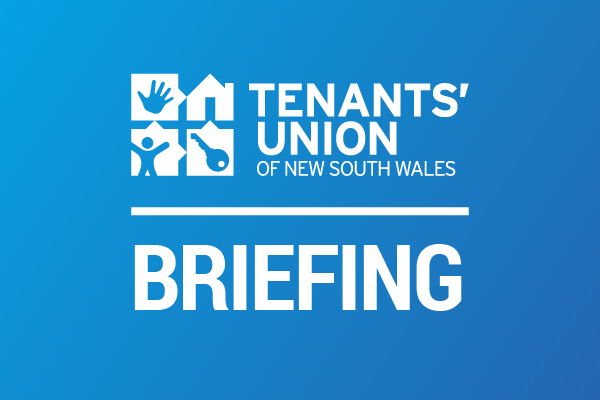Briefing: Residential services registration & accreditation
01/03/2012
The marginal rental sector serves a valuable role in our housing system, but it is not well-regulated. Unlawful boarding houses – often ordinary houses and flats that have been internally subdivided – exploit vulnerable renters, aggravate their neighbours, and give legitimate boarding houses a bad name.
Many legitimate boarding house operators also provide poor quality services. This is particularly a problem in relation to Licensed Residential Centres for people with disability.
Existing regulations are scattered across different pieces of legislation, and there is no single point of contact for consistent liaison between government and stakeholders.
The marginal rental sector needs stronger, clearer regulation that takes action against unlawful operators, helps legitimate operators work on a better organised basis, and assures renters and the general public that services are run well.
A key reform would be registration and accreditation for boarding houses and other residential services.
We propose a single registration and accreditation scheme, under a new stand-alone Residential Services Act, that makes sufficiently differentiated provision for the different types of services it would cover.
A new Residential Services Act
The Residential Services Act would comprise the following elements.
A broad definition of ‘residential services’
We suggest that a residential service exists where an operator grants to a person, for value, a right to occupy premises, or part of premises, for use as a residence and where:
- the person is to share a bedroom with two or more persons (any one of whom occupies by separate grant of the operator); or
- the person is to share the premises, or share kitchen, dining, bathroom or living facilities, with four or more other persons (any one of whom occupies by separate grant of the operator); or
- the premises are one of several adjoining or collocated premises (such as in a strata scheme), to which the operator provides food or personal care services.
This definition means that the registration and accreditation scheme would include not only boarding houses, but also students’ halls of residence, crisis accommodation and refuges, and serviced rental housing arrangements along the lines of ‘SunnyCove’ villages. There should be specific exclusions for retirement villages covered by the Retirement Villages Act 1999 (NSW), and genuine share housing arrangements (that is, where the premises are subject to a residential tenancy agreement, and the right to occupy is granted by one or more tenants who reside at the premises).
A requirement that all residential services be registered
Residential services would be required to be registered on a register maintained by the Residential Services Registrar (we discuss this office below). It would be an offence to operate an unregistered residential service, and registration could be refused where the operator is not a fit and proper person (including because of previous breaches of the Act). (Note that land use consent decisions about residential services would remain with local councils or other relevant development consent authorities.)Eligibility for government incentives, such as the land tax exemption, residential rating and the Boarding House Financial Assistance Program, would be conditional on registration. The registration process would collect information about the residential service for the purpose of identifying an appropriate ‘Service Description’ and an appropriate class or classes of ‘Accreditation’ (we discuss these terms below). Operators would be required to periodically re-register, in order that information is kept up to date and any changes in the way they operate may be identified. The register would be publicly available (including on the internet), and the entry for each residential service would include the address of the premises, the name of its operator, its Service Description and Accreditations (except for refuges, which would not appear on the public register).
Provision for various Service Descriptions
These would include Student Accommodation, Boarding House, Crisis Accommodation, Refuge, and such other descriptions as may be prescribed by regulation. The purpose of these descriptions would be to better inform persons perusing the register – whether they are prospective users of residential services, or government and non-government agencies planning their work with residential services.
A requirement that residential services be accredited
Accreditation would be required within a specified period (we suggest six months, as under the Queensland Act) of either becoming registered or commencing the provision of the relevant service. We submit that when the registration scheme commences, already existing residential services should have to register immediately, but then have some time (say, one year) to become accredited (except for Licensed Residential Centres, which should be deemed accredited, and have to apply for re-accreditation, immediately). It would be an offence to operate a service without the appropriate accreditation after the period for accreditation: penalties would include loss of accreditation and/or registration; prohibitions on operating a residential service; and criminal penalties.
Provision for different classes of Accreditation
The classes of Accreditation would be Accommodation Service, Food Service and Personal Care Service. Every registered residential service would be required to be accredited as an Accommodation Service; depending on the services it provides, a residential service may have to be accredited as neither, one or both of the other classes (Licensed Residential Centres would be accredited as all three.)
Accommodation Services
To be accredited as an Accommodation Service, a residential service would have to show compliance with certain Accommodation Standards. These would include the standards currently at Part 1, Schedule 2 of the Local Government (General) Regulation 2005 (NSW), a standard that requires use of either residential tenancy agreements or occupancy agreements in the appropriate form (see the second part of this submission for more on occupancy agreements) and such other standards as may be prescribed by regulation. It would be an offence to breach the Accommodation Standards.
Food Services
A residential service that provides one or more meals each day would be required to be accredited as a Food Service, and as such would have to show compliance with additional Food Service Standards, as may be prescribed by regulation.
Personal Care Services
A residential service that provides ‘personal care services’ – being services that are addressed to the support needs of vulnerable persons, including management of finances or medication – would be required to be accredited as a Personal Care Service. As such the residential service would have to show compliance with additional Personal Care Service Standards. These would reflect the obligations currently at Part 2 of the Youth and Community Services Regulation 2010 (NSW) (with a strengthened obligation to ensure residents’ access to advocacy services), and such other standards as may be prescribed by regulation.
The Residential Services Registrar
The Act would establish the Residential Services Registrar as an independent statutory authority, with responsibility for maintaining the register, assessing applications for registration and accreditation, monitoring compliance with standards, cancelling accreditations and registrations, and referring more serious breaches for prosecution.
The Registrar would also produce resources to help operators with registration and accreditation, promote best practice, liaise with operators and inform government policy-making. We suggest the Registrar’s office might also become a ‘one-stop shop’ for operators’ dealings with government: for example, applications for land tax exemptions and Boarding House Financial Assistance Program grants.
The registration and accreditation scheme in action
It is useful to consider a couple of examples of how the Registrar’s registration and accreditation processes would work in practice.
First, say a boarding house is registered and accredited as an Accommodation Service only, and the operator decides to start offering meals as part of the service. The operator would have six months to get the meals service going in a way that complies with the Food Service Standards. If the boarding house receives Food Service accreditation, the meals can continue; if not, the meals must stop and the boarding house can continue to operate as an Accommodation Service.
Secondly, say a boarding house is registered and accredited as an Accommodation Service only, but when the operator fills out the forms to renew the registration, the information they give indicates (and this is confirmed by a phone call from the Registrar’s office) that for one resident the operator holds money and helps manage their spending. This is an activity of a Personal Care Service. The Registrar could treat this as a breach of the Act, but instead decides to advise the operator that the activity is one that requires accreditation and supplies the operator with materials to assist in the development of the operator’s practices and application for accreditation.
Thirdly, say a property owner is letting rooms in an unlawfully subdivided house, particularly to international students. A total of eight persons are accommodated: three sharing one room, two each in another two rooms, and an agent of the property owner in a fourth room. This fits the definition of a residential service in two ways –the three persons sharing a bedroom, and the total number of persons sharing the premises – and it is not a genuine share house. The Registrar receives a complaint about the residential service, notes that it is unregistered and prosecutes the operator for breach of the Act. The local council may also prosecute under its regulation of land uses.


